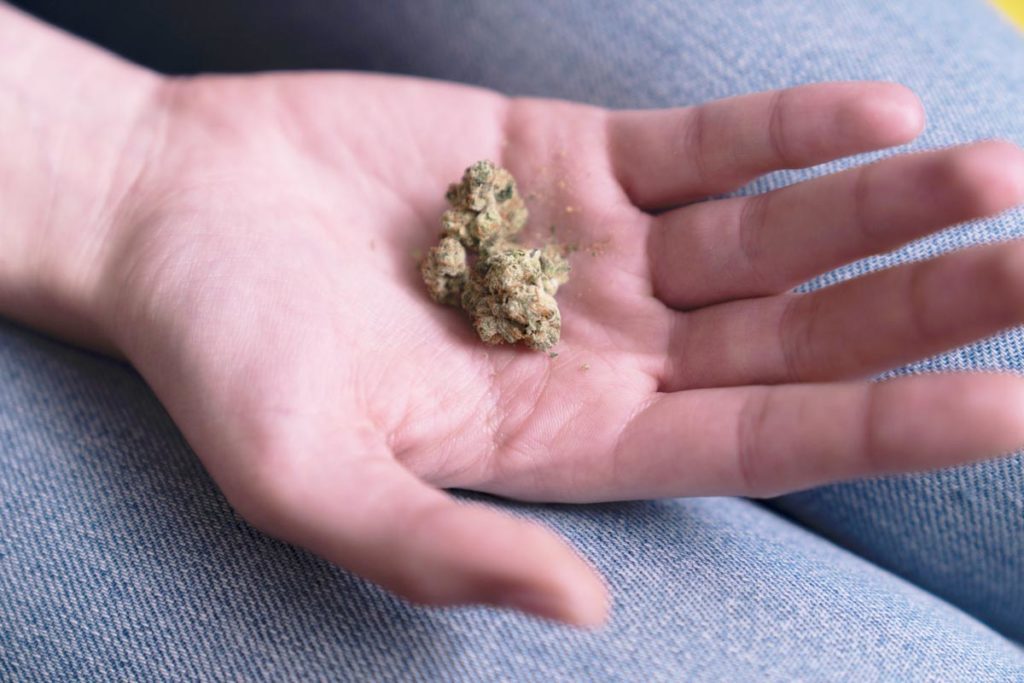Today, marijuana is more accepted for everyday and recreational use than at any other point in history. In fact, with 18 U.S. states offering legalized recreational usage, it’s become common to use cannabis in a similar fashion to alcohol in many places. While that legalization offers avenues to safely explore a low-risk drug without breaking the law, it also means that at-risk and vulnerable populations are exposed to it more often. For example, while marijuana is considered low risk, so is alcohol. And, alcohol costs several trillion in annual healthcare costs and kills 95,000+ people per year. The thing is, marijuana is a drug, and that means it interacts with the brain and the body, sometimes in unexpected ways. That’s especially true for persons with schizophrenia, with significant evidence showing links between cannabis and rising schizophrenic tendencies.
If you or a loved one are using cannabis, especially heavily, there is a risk. In addition, if you have a schizophrenia diagnosis, there’s a significant risk that cannabis will exacerbate symptoms. Therefore, it’s important that you understand the risks. In almost every case, you should also have a discussion with your doctor.
The Genetic Link Between Marijuana and Schizophrenia
Studies increasingly show a strong link between genetics and developing schizophrenia following cannabis usage. That is in line with what we know about schizophrenia, as a genetically inherited disorder. However, the genes AKT 1 and COMT are linked to schizophrenia showing up after cannabis usage. Here, users with a AKT 1 C/C gene expression are as much as 7 times more likely to show symptoms of schizophrenia following cannabis usage than any other expression of the gene. The C/C expression of the gene is the only one that has a link to schizophrenia.
Genetic variations in COMT activity can also influence schizophrenia. COMT regulates an enzyme that degrades dopamine and norepinephrine so they can be reabsorbed back into the brain. One study found that cannabis interacts with some expressions of the COMT gene to cause faster degradation, which reduces the quantity of those neurotransmitters in the brain, especially dopamine. The end-result is significant shifts in emotional regulation, anticipation, and reward circuit processing – which can trigger latent schizophrenia or trigger schizophrenia symptoms.
In both cases, there’s a direct genetic link between likelihood of schizophrenia and a gene. Both likely interplay with psychosis and vulnerability to psychosis.
Get your question answered now.

Cannabis and Vulnerability to Psychosis
Cannabis is proven to cause psychosis, paranoia, and hallucinations, especially in large doses. The hallucinogenic interacts with dopamine and serotonin, which can result in visual and auditory hallucinations. That psychosis can interact very badly with a genetic predisposition to schizophrenia. For example, a high dose of cannabis can cause a short-term episode of psychosis. However, this impacts long-term mental stability and can result in increasing episodes of non-cannabis related psychosis. And, while cannabis usage increases instances of psychosis in people with and without schizophrenia, it’s only for the latter group that you risk triggering latent schizophrenia.
Lowering Age of Diagnosis
In one study, it was shown that a group of male participants with a family history of psychosis would receive a diagnosis for schizophrenia 2.8 years sooner if they smoked versus if they did not. This study reviewed data from the National Survey on Drug Use and Health over 16 years, determining that cannabis usage does increase the speed at which people receive a diagnosis.
Early Usage Increases Risks
The sooner you start using cannabis, the more likely it is that you develop schizophrenia. However, this can be a correlation. For example, users who start using marijuana before the age of 25 are more likely to develop schizophrenia at a later age. However, people quite often receive a diagnosis before 25. However, early episodes of psychosis can be significant to a still developing brain. Heavily using cannabis in your teens and early 20s creates further risks of those changes to the brain becoming permanent, which can exacerbate existing conditions for schizophrenia. In fact, the dopamine and serotonin shifts caused by heavy cannabis usage can actually become permanent or semi-permanent.
Volume of Use Is Important
Most studies agree that smoking once a week is unlikely to do any harm to most people. However, the more people smoke or use, the more likely they are to experience significant side effects, including an increased likelihood of schizophrenia. However, even light users, smoking once or less per day, still experience a diagnosis for schizophrenia as much as 2 years earlier than their non-using peers. This means that even light usage can be significant to your mental health, especially if you have a pre-existing disposition towards schizophrenia.
Causation vs Correlation
While there’s significant evidence that cannabis can trigger schizophrenia, there’s absolutely no evidence that cannabis causes schizophrenia. Instead, schizophrenia is a genetic disorder, relating to about a half dozen genes that interplay together. High exposure to psychosis and psychotic episodes are known to trigger a latent expression of schizophrenia, but the latent disposition has to exist already.
That’s important because it means that while 0.5-1% of the population has schizophrenia, a further 3% are vulnerable to developing schizophrenia because of prolonged exposure to cannabis. However, even that is poorly understood. For example, do people triggering a schizophrenic diagnosis start using cannabis to relax and to self-medicate symptoms they were already experiencing? Would the symptoms have come to light only slightly later without cannabis? It’s true that people who smoke cannabis are 40% more likely to have a schizophrenia diagnosis than those who don’t, but are schizophrenics more likely to use cannabis? After all, schizophrenia increases instances of risk-taking and self-medication, and cannabis is available, often pushed to treat medical conditions, and largely considered safe.
There’s significant research into how cannabis interacts with schizophrenia and vice-versa. Cannabis can increase episodes of psychosis, which, in turn, exacerbates schizophrenia. However, cannabis cannot cause schizophrenia on its own. And, we don’t know enough about early onset and development of schizophrenia with versus without cannabis usage to clearly say that cannabis contributes to the diagnosis rather than exacerbating it. However, we do know that cannabis makes schizophrenia symptoms worse. If you have a mild case of schizophrenia and start using, those symptoms are likely to get worse. Sometimes, they never get better. That can result in requiring anti-psychosis medication.
Therefore, if your family has a history of schizophrenia, it’s never a good idea to use cannabis. A very light usage pattern is likely to pose no risk. However, if you do have schizophrenia, you’re especially vulnerable to self-medication and patterns of escalation that put you at risk for addiction. Therefore, the safest option is always abstinence.
Marijuana does not mix well with schizophrenia. In fact, it can sometimes trigger an otherwise unnoticed disorder. However, it also increases symptoms of existing disorders, making psychosis and episodes worse. If you’re using and have schizophrenia, it’s always best to ask for help, to quit, and to seek out mental health treatment to help you learn new behaviors and coping mechanisms.
If you or you loved one need help with mental health treatment, drug rehab, or alcohol rehab Compassion Recovery Center is here to help. Contact us to ask about our mental health programs and how we can support your specific requirements as you move into treatment.










